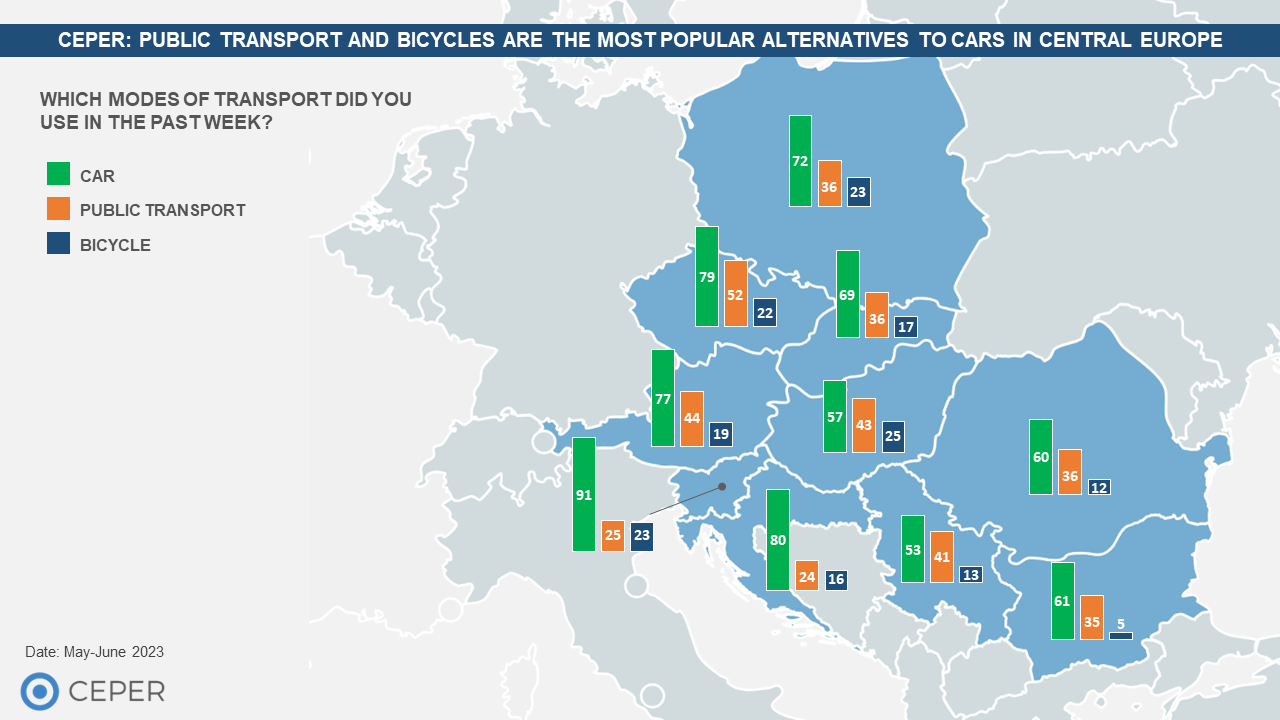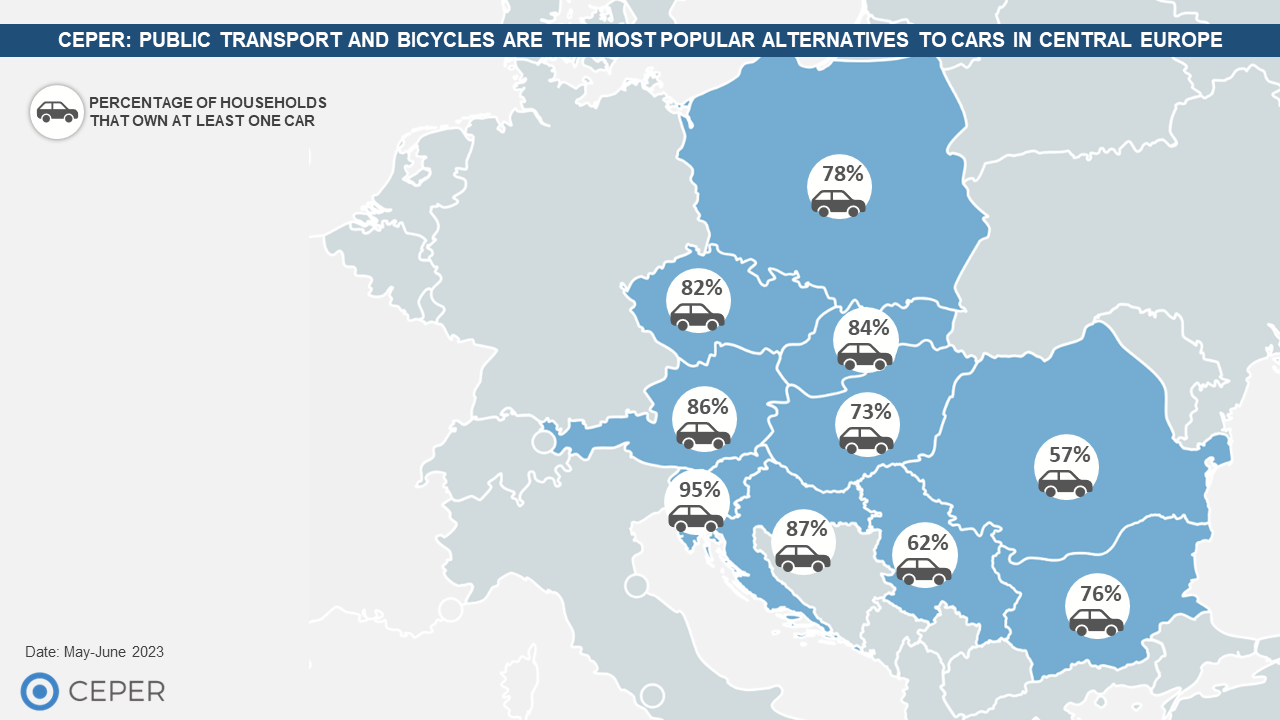CEPER: Public Transport and Bicycles are the Most Popular Alternatives to Cars in Central Europe
Over 50% of respondents from all Central European countries have used a car in the past week, while the public transport was used between 24% to 52% of respondents in the surveyed 10 countries. Bicycles were used by up to 25% of respondents.
The transport habits of individuals matter a great deal in the life of cities as well as from the perspective of sustainability. To map habits related to mobility, 1 000 respondents from 10 Central European countries were asked about the modes of transport they used in the past week as well as whether their household owns at least one car. Thereinafter, CEPER gives an insight into the results of the survey that was conducted in April and June 2023.

In all the surveyed countries over 50% of respondents have used a car in the past week. 2 countries had weekly car usage rates above 80% (Croatia and Slovenia), 3 countries between 70-80% (Austria, Czechia and Poland) while in the remaining 5 counties between 50-70% of people said that they have used a car in the past week. The lowest percentage of respondents who used a car (53%) was in Serbia, while the highest in Slovenia (91%). While some of these respondents used a mixture of modes of transport in the past week, in every surveyed country over 30% of respondents have used exclusively cars to travel in the past week. In Croatia and Slovenia 55 and 56% of respondents used only cars as a mode of transport. In Bulgaria, Romania and Slovakia between 40 to 50% of respondents used exclusively a car to travel, while in the remaining 5 countries between 30-40% of respondents used exclusively a car in the past week to get around.
While consistently in every surveyed country at least half of the respondents used cars in the past week, maximum about half of the respondents used the public transport (including city transport, long-distance buses, and trains) in the same time period. Between 40-55% of respondents from 4 countries (Austria, Czechia, Hungary, and Serbia) used the public transport in the past week, while the same was true to only between 30-40% of respondents from Bulgaria, Poland, Romania, Slovakia. In Croatia and Slovenia only between 20-30% of respondents used the public transport in the past week. In Czechia 52% of respondents (highest rate), while in Croatia only 24% of respondents (lowest rate) used public transport in the past week. In every country less than 25% of respondents used exclusively the public transport to travel in the past week. In Bulgaria, Romania, Hungary, and Serbia no less than 20% but not more than 25% of people used exclusively the public transport. In Austria, Czechia, Poland, and Slovakia between 10-15% of respondents travelled exclusively by public transport. In both Croatia and Slovenia less than 10% of respondents said that they did not use any other mode of transport than the public transport in the past week.
After cars and the public transport, the survey that was conducted during the spring (early summer in Hungary) when the weather already allows for some outside physical exercise found bicycles to be the preferred vehicle. In Hungary 25% whereas in Poland and Slovenia 23% of respondents said to have cycled in the past week. Else than in Hungary, where 8% of respondents used exclusively bicycles to travel in the past week, in neither of the countries uses more than 4% of respondents only bicycles to commute.
The car’s dominance as the most preferred mode of transport can partially be explained by the fact that the majority of households in all the 10 surveyed countries own at least one car. Romania had the lowest car ownership rate among the surveyed countries with 57% of households owning at least one car. Slovenia was characterised by the highest proportion of car ownership, in the South Slavic country 95% of households had at least one car.

Methodology
The opinion-poll survey was carried out in 10 countries in the Central European region: Austria, Bulgaria, Croatia, Czech Republic, Hungary, Romania, Serbia, Slovakia, Slovenia and Poland. The data were collected in April 2023 in 9 of the studied countries and in June 2023 in Hungary. The survey was conducted by telephone (in person in Serbia) with 1 000 respondents per country. The sample per country is representative by gender, age and type of settlement.
About us
CEPER is the brand of CEPER Group GmbH. The CEPER acronym abbreviates Central European Perspectives. CEPER's area of expertise is Central European affairs, the company offers media monitoring, market research and opinion polls from the region to its clients.
|
|
Austria |
Bulgaria |
Croatia |
Czechia |
Poland |
Romania |
Serbia |
Slovakia |
Slovenia |
Hungary |
|
Yes |
86 |
76 |
87 |
82 |
78 |
57 |
62 |
84 |
95 |
73 |
|
No |
13 |
24 |
13 |
18 |
21 |
43 |
38 |
16 |
4 |
27 |
|
DK/NA |
1 |
0 |
0 |
0 |
1 |
0 |
0 |
0 |
1 |
0 |
Does your household own at least one car? (In %)
|
Austria |
Bulgaria |
Croatia |
Czechia |
Poland |
Romania |
Serbia |
Slovakia |
Slovenia |
Hungary |
|
|
car |
77 |
61 |
80 |
79 |
72 |
60 |
53 |
69 |
91 |
57 |
|
public transport (public transport in respondents’ city, long-distance bus, and train) |
44 |
35 |
24 |
52 |
36 |
36 |
41 |
36 |
25 |
43 |
|
bicycle |
19 |
5 |
16 |
22 |
23 |
12 |
13 |
17 |
23 |
25 |
|
Other mode of transport (ship, motorcycle and other) |
7 |
2 |
7 |
10 |
4 |
2 |
2 |
12 |
6 |
7 |
|
Did not use any mode of transport |
2 |
14 |
6 |
3 |
8 |
13 |
16 |
4 |
2 |
5 |
Which modes of transport did you use in the past week? (In %)